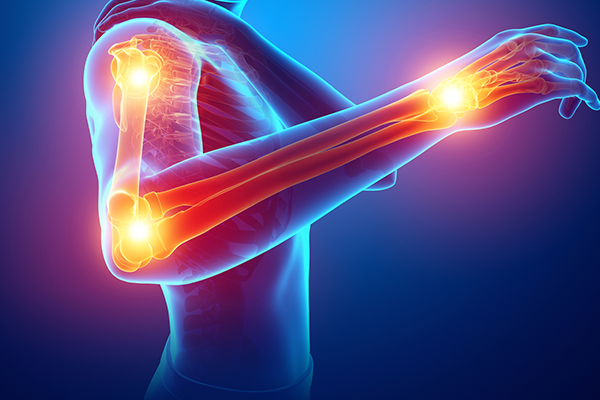Overview
Orthopaedic injury or disease of the hand, wrist and elbow can greatly affect your freedom of movement throughout your day. Epworth patients have the freedom to choose their doctor and wait only a fraction of the time it would otherwise take in the public system, so you can get back to enjoying life sooner.
What causes elbow or wrist and hand pain?
The most common cause of hand, wrist and elbow pain is overuse due to repetitive movements resulting in inflammation or nerve pressure. However, injury or disease may also result in elbow, hand or wrist pain.
When is hand, wrist or elbow surgery recommended?
If you have recurrent pain and find it difficult to do everyday activities, Epworth orthopaedic surgeons may recommend surgery to increase mobility and reduce pain.
Below are some broad signs that should prompt you to consult your GP to get a referral to an Epworth specialist:
- Pain during activity.
- Stiffness and swelling that doesn’t go away.
- Pain that severely impacts your quality of sleep.
- Reduction in your quality of life or avoidance of activities you enjoy because pain.
Conditions
Common conditions and injuries which may require surgery
-
Carpal Tunnel SyndromeCarpal tunnel syndrome is caused by repetitive movements of the wrist and hand, resulting in pressure on the median nerve. Symptoms include pain, numbness and tingling in the hand and forearm. Without treatment, carpal tunnel syndrome will unfortunately worsen over time and we recommend that you speak with your doctor as soon as you notice any signs or symptoms.
-
Dupuytren’s diseaseDupuytren’s disease tends to progress slowly, causing the tissue in your palm to become abnormally thick and less flexible, forcing one or more fingers to slowly curl inward.
-
Ganglion cystGanglion cysts are non-cancerous lumps of fluid that typically form on the tendons or joints in the hands or wrists.
-
Trigger finger and thumbTrigger finger or trigger thumb is caused by repetitive movement, causing the flexor tendons to thicken, causing the affected finger to stay curled or suddenly pop out straight when attempting to flex the hand. Trigger finger is caused by repetitive movement and is common in people with health conditions such as diabetes or rheumatoid arthritis. Symptoms can include painful stiffness or the finger or thumb in a particular position.
-
OsteoarthritisOsteoarthrosis is a common form of arthritis in the elbow, wrist or hand. If you are over 40 years old or have had a hand, wrist or elbow injury, you may be more likely to develop osteoarthrosis.
-
FracturesThere are many different types of fractures that can occur in the hand, wrist or elbow that can result from a fall, collision or an abnormal twist to any of the joints.
-
SprainA sprain is a common injury caused by tearing or over-stretching the ligaments that support your hand, wrist or elbow joints.
-
Golfers elbow (medial epicondylitis)Golfer’s elbow is inflammation or microtears of the tendons along the inner part of the elbow due to excessive use and repetitive movements.
-
Tennis elbow (lateral epicondyle)Similar to golfer’s elbow, tennis elbow is an overuse injury. However, tennis elbow is when the outer part of the elbow’s tendons are inflamed or have microtears.
Diagnosis
The Orthopaedic Unit has dedicated teams of nursing, medical and allied health staff to expertly manage and evaluate all orthopaedic conditions.
Evaluation
Once you have received a referral from your GP, you will be able to book an appointment with an Epworth specialist. Your specialist will then assess your X-rays, medical history and physical exam to provide personalised treatment options.
Medical imaging
- During the early stages of investigation, your doctor will likely arrange X-rays or Magnetic Resonance Images (MRIs) to examine your bones and cartilage.
Medical history
- Your specialist will ask you questions about your ability to perform everyday activities, pain level and general health.
Physical exam
- During your consultation, your doctor will perform a physical exam to assess your mobility and strength.
Fees
When booking an appointment with your specialist, you can speak with their administrative team to understand the fee for the consultation. We then recommend speaking with your insurance company to determine your out-of-pocket costs.
Treatment
Depending on your condition and personal circumstance, your doctor will advise which type of elbow, wrist or hand treatment is best for you.
Hand, wrist and elbow treatment examples:
-
Non-surgical treatmentDepending on your injury or condition, you may be recommended to make lifestyle changes or non-surgical interventions such as physiotherapy, steroid injections, splints or pain medication. If non-surgical options no longer reduce your symptoms, we encourage you to speak with your doctor about alternative treatment.
-
Hand surgery
- Dupuytren’s disease fasciectomy
- External fixation
- Ganglion cyst removal
- Carpel tunnel release
- Trigger finger and thumb release
- Tendon repair
-
Wrist surgery
- Wrist joint replacement
- External fixation
-
Elbow surgery
- Elbow surgery for tennis elbow and golfer’s elbow
- Keyhole surgery or elbow replacement to treat arthritis
Deciding whether surgery is right for you
The decision to undergo hand, wrist or elbow surgery is a collaborative one. We encourage you to speak with your family, GP and orthopaedic surgeon. The more you know, the easier it will be to decide whether this surgery is right for you.
Fees and private health
Once you speak with your specialist, you’ll be provided with the relevant information to give to your insurance company. Your insurer will provide you with the breakdown of treatment fees.
Find your Epworth specialist
Our locations
Hand, wrist and elbow treatment locations:
Preparing for surgery
We are here to support patients and their families in preparing for surgery.
We encourage you to view the videos below, which outline the patient journey to give you the confidence to be an active participant from your pre-operative exercise program through to your return home and post-surgery recovery.
To learn more about your anaesthetist's role during the surgery and what to expect beforehand, watch the video below.
Rehabilitation
Epworth Rehabilitation can support people preparing for joint replacement or ligament surgery or recovering from an injury or surgery.
Home preparation
Occupational therapists recommend you review your home environment and implement simple modifications, moving trip hazards such as rugs and cords from walkways to ensure your home is safe following your surgery.
Ordering assistive aids
Recovery
Our aim is to provide you with comprehensive and compassionate recovery care that will help you return to an independent and functional lifestyle as possible.
The day after your surgery
We are here to support you to get back to your life as soon and as safely as possible. Your care team will often try to get you moving the day after your operation. This will support your recovery and reduce the likelihood of complications, so you can book your next holiday, get back to playing sport, or return to work sooner.
Physiotherapy
Your physiotherapist will assist you in completing a daily walking and exercise program. The planned exercises aim to restore the range of movement and muscle strength.
Pain management
It is normal to have some pain following major surgery. By controlling your pain as best we can, you are likely to recover faster. The team caring for you will offer you medications to manage your pain, enabling you to participate in your walking and exercise program. It is important to be proactive in asking for pain relief. As your pain improves, you will gradually require less pain medication. You will be supplied with pain relief medication on discharge.
Rehabilitation
Depending on your personal needs and your GP or surgeon’s recommendations, you may be referred to a rehabilitation program.
How rehabilitation supports your recovery
Guided by regular support from Epworth physiotherapists and occupational therapists, rehabilitation will help you to feel stronger, safer and more confident to participate in everyday life activities.
To learn more about what you can expect from your rehabilitation program, please watch the video below.
Rehab after your joint replacement surgery
Achieve your post-surgery goals
Our rehabilitation team will assess and develop a specific rehabilitation program based on individual needs and goals. Your program will consider factors such as pain, arthritis, movement, and personal goals such as returning to work or sport.
Rehabilitation programs
There are a few ways you can access our rehabilitation programs. Your surgeon and care team will work with you to identify the best option:
Rehabilitation at home
- Your health fund supplies rehabilitation at home. It includes a physiotherapist who will visit you and develop a program you can complete in your home. Our team will also connect you to local services such as gyms and pools if it benefits your recovery. The team will also recommend equipment you may like to purchase or hire to support recovery and long-term health.
Outpatient program
- Outpatient program involves visiting the hospital a few times a week to complete your rehabilitation program.
Inpatient program
- If you are recommended an inpatient program, you will stay in our rehabilitation hospital for about 5-7 days after your surgical admission.
Why choose Epworth for rehabilitation?
Epworth rehabilitation offers patients access to purpose-built gymnasiums, hydrotherapy pools and other specialised rehabilitation equipment. We also have therapy spaces that reflect real-life rooms to practise day-to-day activities.
Fees and health insurance
Depending on the level of your private health insurance, our rehabilitation services may be covered by your health fund. You can also choose to self-fund if you prefer. Whichever option you choose, we will provide you with the financial information when you are referred to Epworth Rehabilitation.
Orthopaedic rehabilitation
Hand therapy
Hands play a vital role in our daily lives, so when we experience problems with them, the impact is significant.
Hand therapy is dedicated to assessing and treating conditions affecting the hand and upper limb which may include recovery from an accident or trauma, chronic problems such as carpal tunnel syndrome or limited use of hands or limbs following surgery.
Treatment may include
- Condition-specific exercises
- Swelling management
- Help with sensitivity from nerve injuries
- Custom splinting
- Adaptive function techniques
- Scar management.
Hand therapy is provided by occupational therapists or physiotherapists who have completed extra training to specialise in this area.
You can access a hand therapist via Epworth Private Practice
Epworth Private Practice provides direct access to a range of allied health therapies that support your physical and mental health and wellbeing. No referral is needed to make a booking.


